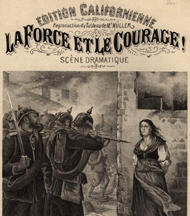Politics in California Sheet Music
Sheet music can convey nationalistic fervor, campaign propaganda, political
messages, and commemorations for events and institutions. The stirring
fervor of the instrumental march was often declared a political message by
its title or cover illustration. Occasionally religion and politics are
mixed. The composed concert song or vaudeville tune can tell of social
conflict in unique
ways.
Civil War "United Forever!" (1861) and "Yes! I Would the War Were Over" (1863) must have proclaimed
popular sentiments from the stage. "Jeff Davis' Dream" from the production
of the "Gigantic Polyorama of
the War" in 1863 tells the story of how Davis sold his soul to the devil.
"We're Freemen Now" celebrates the emancipation of slaves
following the Civil War. The plight of the southerner in the west after the Civil
War is eloquently told in "My Native South" (1867) ("but do not bid me hate
the South"). "Yankee Doodle" is a long-lasting patriotic war song.
While the piano piece "Marching Through Georgia" has no words, it must have
evoked images in the minds of listeners. A somber portrait of Gen. E. S.
Canby is on the cover of Wilder's "Funeral March" (1873).
Anti-Railroad An anonymous "Anti-Monopoly War Song" for the
Anti-Monopoly Party of California (1882) has several verses opposing the
"railroad robbers" who made of citizens "victims of vile subsidies."
Spanish-American War
"The Song of the American Volunteer" celebrated the soldiers. A. Nelson
Adams, the
band director of the Eighth Army Corps Band, used his tenure to compose
"Camp Dewey March" and "Eighth Army Corps March" which were published in
Manila and San Francisco with
covers containing photographs of the army camps. "On the Day that Dewey Comes
Home" probably proclaimed on the stage sentiments popular at the time.
"Comrades" by Felix McGlennon celebrates America's soldiers; two editions
appeared in San Francisco in 1899.
Campaign Songs "Garfield Our Best Man" (1878),
"Hurrah for Grover Cleveland" (188?),
Commemorations The "G. A. R. Grand March" celebrated the 20th National
Encampment of the Grand Army of the Republic at San Francisco in 1886.
Another commemoration for visiting veterans was "Old Comrades of the War," a
song by H. B. Pasmore, words by Sam Booth.
"Himno a Mexico" by local composer Domenico Speranza celebrated the 60th
anniversary of the Mexican Independence and included a portrait of Mexican President
Don Sebastian Lerdo de Tejada.
The "Battle of Prague" uses the piano to narrate the stages of the battle
between Prussians and Imperialists, as did the "Battle of Waterloo" for another
set of combatants.
 Nationalism Many of the immigrants were able to buy sheet music
in California that proclaimed their love of their homeland. "Fair Land of
Poland," several editions of "Wearing of the Green" decorated with the national
emblem of Ireland, German songs such as "My Native Land" and "Heimweh" were
published in San Francisco. "La Force et le courage: Scene dramatique"
portrayed revolutionary times in France. "Blue Alsatian Mountains" recalls
a geographical area with both German and French roots.
Nationalism Many of the immigrants were able to buy sheet music
in California that proclaimed their love of their homeland. "Fair Land of
Poland," several editions of "Wearing of the Green" decorated with the national
emblem of Ireland, German songs such as "My Native Land" and "Heimweh" were
published in San Francisco. "La Force et le courage: Scene dramatique"
portrayed revolutionary times in France. "Blue Alsatian Mountains" recalls
a geographical area with both German and French roots.
Marches "Marching Through Georgia" (1865), "Light Infantry March"
(1874), "Grant Military March" with a portrait of Grant upon his horse
upon his visit to San Francisco in 1879, "Freedom Forever, A New National
March,"
Religion and Politics "The Battle Prayer" by Himmel was reprinted
by Gray in San Francisco. California is described in "The Promised Land," an
"evangel song," that tells how "along the mighty coast we will man the
picket line."
Social Conflict The full force of prejudice and strife against
and between two
underclasses, African Americans and Irish, is described in the
verses of "Nigger, Nigger." The story of the struggle of the Native American
against the paleface is told in "La Indita." The working girl tells her
story in "The Tough Girl" (1894) and in "Clementina Moore the Girl in the Dollar
Store" (1869).
Materialism The materialism of society is bemoaned in "The Merry
Chink, Chink, Chink" [of money] by A. M. Gretchen. A parody of "Champagne
Charlie" is Alfred Lee's "Coal Oil Tommie" from Pennsylvania, as sung in "The
Lottery of Life."
 Nationalism Many of the immigrants were able to buy sheet music
in California that proclaimed their love of their homeland. "Fair Land of
Poland," several editions of "Wearing of the Green" decorated with the national
emblem of Ireland, German songs such as "My Native Land" and "Heimweh" were
published in San Francisco. "La Force et le courage: Scene dramatique"
portrayed revolutionary times in France. "Blue Alsatian Mountains" recalls
a geographical area with both German and French roots.
Nationalism Many of the immigrants were able to buy sheet music
in California that proclaimed their love of their homeland. "Fair Land of
Poland," several editions of "Wearing of the Green" decorated with the national
emblem of Ireland, German songs such as "My Native Land" and "Heimweh" were
published in San Francisco. "La Force et le courage: Scene dramatique"
portrayed revolutionary times in France. "Blue Alsatian Mountains" recalls
a geographical area with both German and French roots.